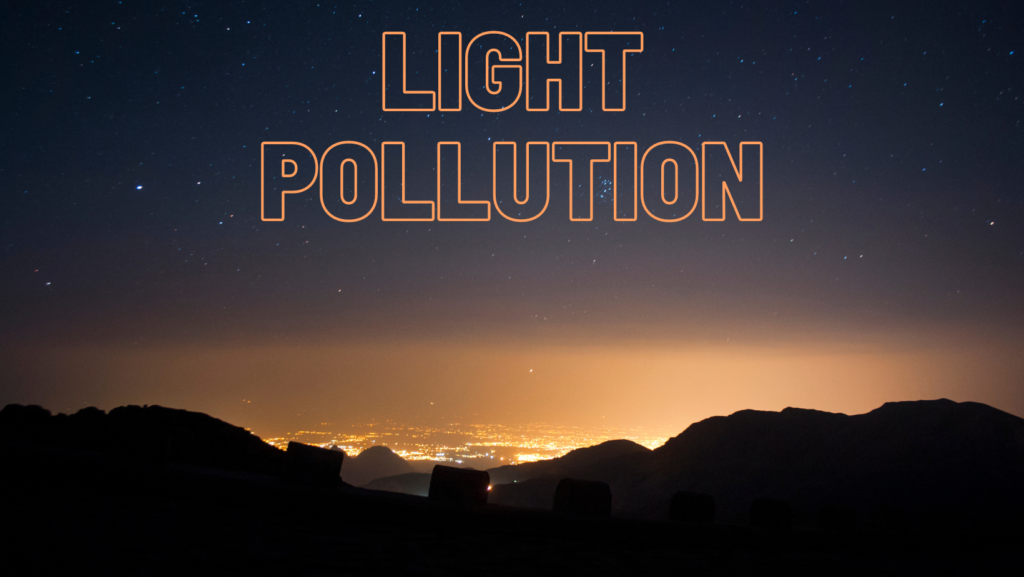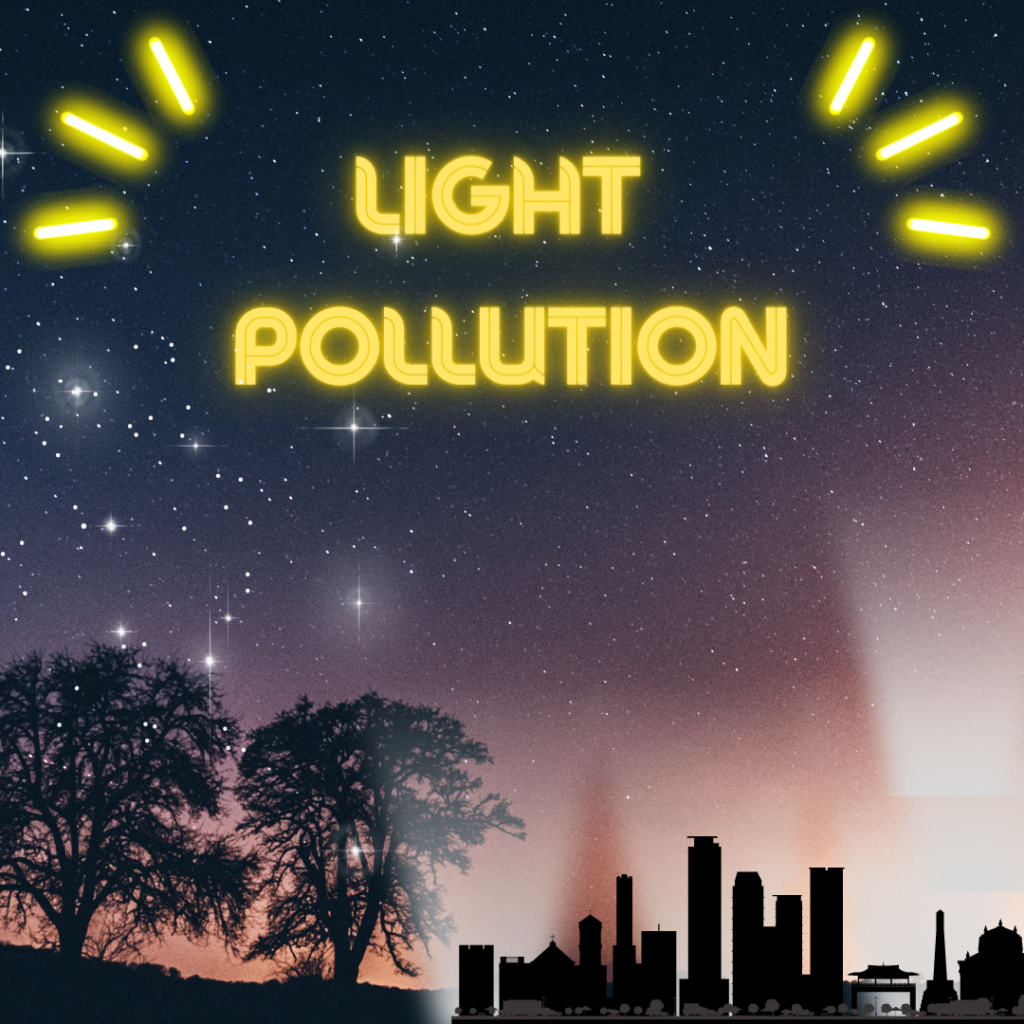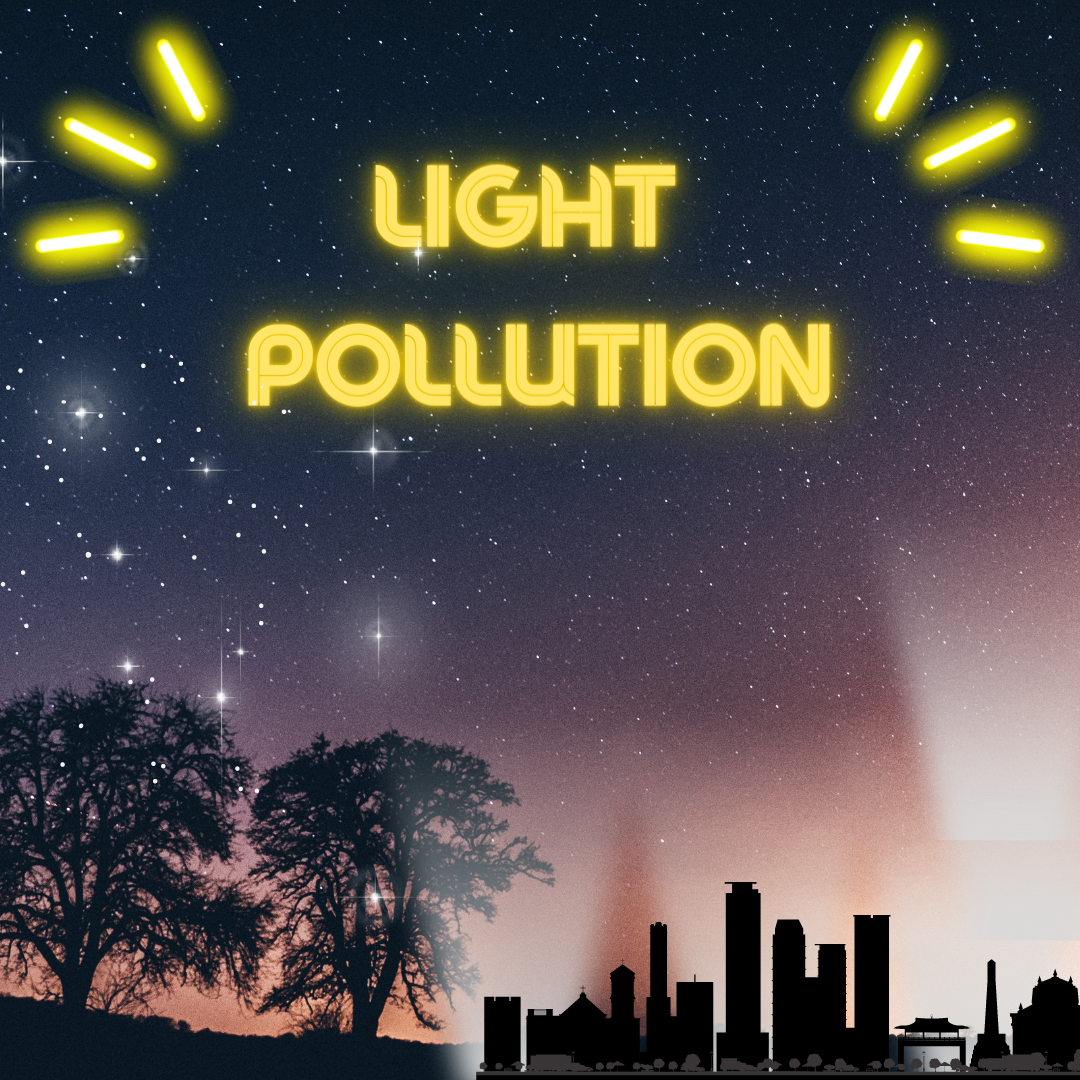Light pollution

Light pollution is defined as it is unwanted light which is present in our environment, Light pollution occurs the artificial lights are used by us. In other words, Light pollution is defined as excessive, misdirected, or obtrusive artificial (usually outdoor) light. Light pollution has consequences: it washes out starlight in the night sky, interferes with astronomical research, disrupts ecosystems, has negative health effects, and wastes energy. Because light pollution significantly limits the visibility of stars and other celestial objects, it has a negative impact on amateur and professional astronomers as well as casual night sky watchers. Sky glow, or upward-directed light coming from poorly constructed or aimed lamps and security floodlights, is the cause of the decreased visibility of the night sky. This wasted light obscures the night sky in the eyes of people on the ground by being scattered and reflected by solid or liquid particles in the atmosphere. Sky glow from a town or city can be seen far from its primary source and does not always have a localized effect.
What are the causes of Light Pollution?
It is annoying if artificial lighting is employed in inappropriate places. For example, neighbors’ sleep can be disturbed by excessive outdoor light entering their bedrooms. Similar to outside lighting, excessive interior lighting has an impact on the health of those who occupy the space. Light pollution is a type of pollution caused by man-made sources. So there are many causes of Light pollution and some of them are mentioned below: –
- Light Pollution is caused by Residential (Home, Apartment, Buildings) Lights.
- Light Pollution caused by Vehicles and Street Lights.
- Light Pollution is caused by the improper establishment of Lights anywhere.
- Light Pollution caused by outdoor night games stadium.
- Light Pollution caused by Commercial LED screens and Holdings.
- Light Pollution is caused by the careless use of Lights.
- Light Pollution is caused by unwanted uses of Lights in Cities or Smart Cities.
- Light Pollution is caused by using large amounts of led lights in festivals for decoration for example Diwali.
What are the disadvantages of Light pollution?

Pollution is a major problem for people whether it is sound pollution, noise pollution, air pollution, or light pollution. Every kind of pollution affects the living organism and our atmosphere through which the life span of the living organism and the earth decreases day by day. There are many disadvantages of Light pollution and some of them are mentioned below: –
- It affects the people.
It has been established that the improper kind of light or too much light has negative impacts on health and lowers the quality of life. Because of a specific circadian rhythm that is genetically preprogrammed in humans living on Earth, they require a regular cycle of light during the day and darkness at night.
- It affects the Animals.
Animals and insects may be drawn to or repelled by lights. Light pollution throws out the diurnal or nocturnal rhythms that most animal life relies on. This may endanger entire species.
Light pollution has a particularly negative impact on areas that were formerly uninhabited by humans. The changes in their natural environment may cause animals in these locations to react rather sensitively. They might relocate to areas with less light pollution.
- It affects the earth and its environment.
The natural light cycle is essential to the health of the Earth’s biosphere. These ecosystems may be unable to adjust to new artificial conditions brought on by light pollution because they are often very sensitive to environmental changes. Sky glow alone may result in a reduction in growth protection because the Earth is shielded from UV rays by the light that is reflected off the atmosphere. This messes up the development and decay cycles that are necessary for the production of our food, air, and water.
- It affects the sleeping problems of people and animals.
A dark room is typically preferred for resting, and getting enough sleep is important for both our physical and emotional well-being. When trying to sleep, many people find light distractions to be bothersome.
- It affects traffic and is also responsible for accidents.
Traffic may suffer as a result of excessive lighting or improper angles brought on by light pollution, which could result in temporary blindness. If you’re driving a car, this could be risky. The likelihood of accidents may rise if the driver’s vision is adversely affected by excessive light clusters on some streets. Even more dangerous for people, light pollution can disrupt vital navigational equipment used by trains, planes, and even cars.
- It also increases air pollution.
Air pollution that affects the atmosphere is a result of light pollution as well. Huge amounts of electricity are consumed for nighttime lighting, which produces a lot of CO2 emissions and other hazardous chemicals.
- It wastes the country’s resources.
When we use light excessively, we need more and more fossil fuels. For instance, electricity is required to power lights, and industrial operations utilize enormous volumes of coal to produce electricity. Indirectly, we are thus also a part of the depletion of natural resources like coal.
What are the ways to reduce Light Pollution?
There are many ways through which we can reduce light pollution as we above see various effects and problems through the light pollution, So it is very efficient to reduce the Light pollution, we listed some of the solutions below: –
- Always try to turn off the light we they are not in use.
- Always try to install a few lights in indoors.
- Always try to close the curtains and windows at night.
- Always try to avoid driving at night which reduces the use of headlights in vehicles.
- Always try to turn off the light when you are going to sleep or going outside.
- Always try to use Night Shift setting on all devices.
- Always try to use those lights whose faces are downwards to reflect lights towards the ground through which lights don’t focus on the sky.
What are the solutions to Light Population?
Some of the important solutions of Light Pollution are below: –
- Light Defenses.
- Warm Lighting.
- Use Certified Lighting.
- Motion Sensors.
- Educate others.


